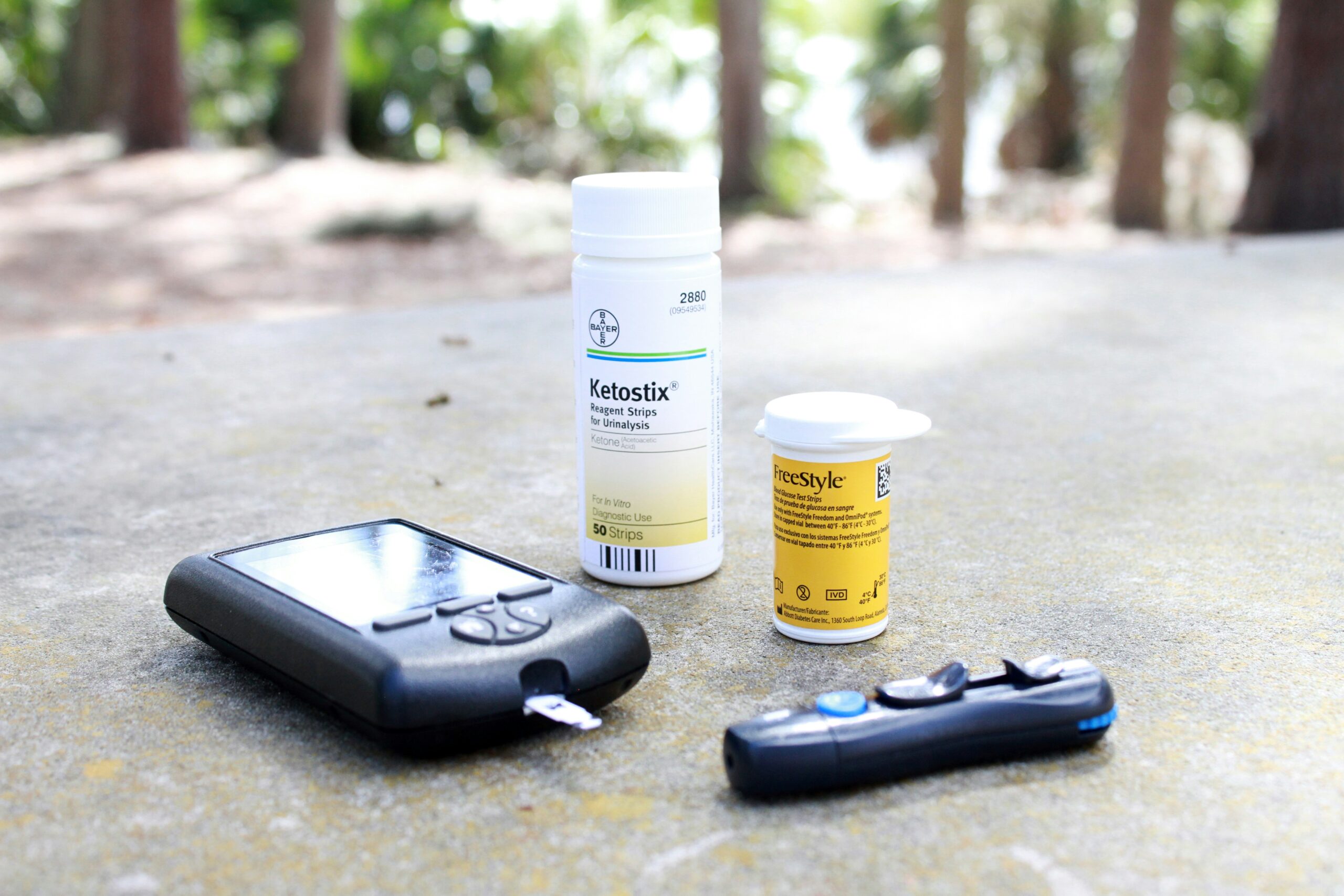Have you ever wondered what the ketogenic diet entails for individuals living with diabetes? In this article, we will explore the concept of “keto with diabetes” and shed light on how this popular dietary approach can be beneficial for managing blood sugar levels. Whether you are newly diagnosed or have been living with diabetes for years, understanding the fundamentals of the ketogenic diet and its potential impact on your health is essential. So, let’s dive in and uncover the world of “keto with diabetes” together!
Understanding Keto Diet
Definition of keto diet
The keto diet, short for ketogenic diet, is a low-carbohydrate, high-fat eating plan that has gained popularity in recent years. It is often used as a means of weight loss, but it has also shown potential in managing certain health conditions, including diabetes. The main goal of the keto diet is to put your body into a metabolic state called ketosis, where it begins to burn fat for fuel instead of carbohydrates.
How keto diet works
The keto diet works by drastically reducing your intake of carbohydrates and increasing your consumption of healthy fats. When you eat fewer carbs, your body’s glycogen stores are depleted, forcing it to turn to fat as its primary source of energy. As a result, your liver converts fat into ketones, which are then used by your body and brain for energy. This shift in fuel source can have various effects on your body, including weight loss and improved blood sugar control.
Foods included in a keto diet
A typical keto diet consists of foods that are low in carbohydrates and high in healthy fats. Some examples of foods that are commonly included in a keto diet are fatty fish, such as salmon and sardines, avocados, eggs, nuts and seeds, olive oil, and non-starchy vegetables like spinach and broccoli. It is important to note that highly processed foods, sugary snacks, and grains are typically avoided on the keto diet.
Potential benefits and risks of a keto diet
The keto diet has been associated with several potential benefits, especially in relation to diabetes management. Some studies suggest that following a keto diet may help improve blood sugar control, reduce insulin resistance, and even promote weight loss. However, it is essential to consider the potential risks as well. Some individuals may experience side effects such as constipation, nutrient deficiencies, and an increased risk of developing ketoacidosis. It is crucial to consult with healthcare professionals before starting a keto diet, especially if you have diabetes or any other underlying health condition.
Understanding Diabetes
Definition of diabetes
Diabetes is a chronic medical condition that affects how your body metabolizes sugar (glucose). It occurs when your body either doesn’t produce enough insulin or doesn’t effectively use the insulin it produces. Insulin is a hormone that helps regulate your blood sugar levels and allows your body to use glucose for energy. Without proper insulin function, glucose builds up in your bloodstream, leading to high blood sugar levels.
Different types of diabetes
There are three main types of diabetes: type 1 diabetes, type 2 diabetes, and gestational diabetes.
- Type 1 diabetes: This type occurs when the immune system mistakenly attacks and destroys the insulin-producing cells in the pancreas. People with type 1 diabetes require lifelong insulin therapy to manage their blood sugar levels.
- Type 2 diabetes: This is the most common type of diabetes. It typically develops when the body becomes resistant to the effects of insulin or when the pancreas fails to produce enough insulin. Type 2 diabetes can often be managed through lifestyle changes, including diet and exercise, and may also require medication or insulin therapy.
- Gestational diabetes: This type of diabetes occurs during pregnancy and usually resolves after childbirth. However, women who have had gestational diabetes have an increased risk of developing type 2 diabetes later in life.
Overview of diabetes symptoms and complications
The symptoms of diabetes can vary depending on the type and severity of the condition. Common symptoms include increased thirst and urination, unexplained weight loss, fatigue, blurred vision, slow healing of cuts or sores, and frequent infections.
If left uncontrolled, diabetes can lead to various complications, including cardiovascular disease, nerve damage (neuropathy), kidney damage (nephropathy), eye damage (retinopathy), and an increased risk of infections.

The Intersection of Keto and Diabetes
The concept of keto diet in managing diabetes
The keto diet has gained attention as a potential tool for managing diabetes. This is because the diet’s low-carbohydrate nature can help regulate blood sugar levels and reduce dependency on insulin or other diabetes medications. By promoting the production of ketones in the body, the keto diet can provide an alternative energy source and potentially improve insulin sensitivity.
How ketosis affects blood sugar level
When the body enters into a state of ketosis, it primarily relies on fat for energy instead of glucose. As a result, blood sugar levels can become more stable, reducing the need for frequent insulin injections or medication adjustments. By limiting the intake of carbohydrates, which are the primary source of glucose, the keto diet can help regulate blood sugar levels in individuals with diabetes.
The interplay between insulin and ketosis
Insulin plays a crucial role in the metabolism of carbohydrates and regulates blood sugar levels. In individuals with diabetes, insulin production or utilization is impaired. However, on a keto diet, the reduced carbohydrate intake may result in lower insulin requirements. As the body adapts to utilizing ketones for energy, the need for exogenous insulin may decrease, but it is important to monitor blood sugar levels and make adjustments as needed under medical supervision.
Studies on Keto Diet and Diabetes
Summary of research findings
Several studies have investigated the effects of the keto diet on individuals with diabetes. A systematic review published in the Journal of Medical Internet Research found that the keto diet can lead to significant reductions in HbA1c levels (a long-term measure of blood sugar control) and may improve lipid profiles in individuals with type 2 diabetes. However, more long-term studies are needed to fully understand the effectiveness and safety of the keto diet in diabetes management.
Highlight of major studies
One notable study published in the journal Nutrition & Diabetes examined the impact of a ketogenic diet on individuals with type 2 diabetes. The study found that participants who followed the keto diet experienced significant improvements in glycemic control, body weight, and medication reduction. Another study published in the journal Diabetes, Obesity and Metabolism demonstrated that the keto diet resulted in greater weight loss and improvements in insulin sensitivity compared to a low-calorie, low-fat diet in individuals with obesity and type 2 diabetes.
Present gaps in research
While there is promising evidence surrounding the potential benefits of the keto diet for diabetes management, there are still some gaps in research. Most studies have focused on individuals with type 2 diabetes, and fewer studies have been conducted on type 1 diabetes and gestational diabetes. Additionally, the long-term effects and safety of the keto diet for diabetes management require further investigation.

Benefits of Keto Diet for Diabetics
Potential positive effects on blood sugar control
One of the primary benefits of the keto diet for individuals with diabetes is its potential to improve blood sugar control. By significantly reducing carbohydrate intake, the keto diet can help regulate blood sugar levels and reduce the need for insulin or other diabetes medications. Some studies have shown reductions in HbA1c levels and improvements in glycemic control in individuals with both type 1 and type 2 diabetes.
Weight loss benefits
Obesity is a common risk factor for the development and progression of type 2 diabetes. The keto diet’s ability to promote weight loss can be particularly beneficial for individuals with diabetes. Several studies have demonstrated that the keto diet can lead to significant weight loss, which may help alleviate insulin resistance and improve overall metabolic health.
Impact on cholesterol and blood pressure
The keto diet has also shown potential in improving lipid profiles and reducing blood pressure, both of which are important factors in managing diabetes. Studies have suggested that the keto diet can lead to favorable changes in triglyceride levels, HDL cholesterol (the “good” cholesterol), and blood pressure, which may be beneficial for individuals with diabetes who are at a higher risk of cardiovascular complications.
Concerns and Risks of Keto Diet for Diabetics
Potential side effects
While the keto diet may offer benefits for diabetes management, it is important to be aware of potential side effects. Some individuals may experience transient side effects such as fatigue, headache, constipation, and nausea when initially adapting to the keto diet. These symptoms are often referred to as the “keto flu” and typically resolve within a few days as the body adjusts to using ketones for energy.
Concerns about nutrient deficiencies
The restriction of certain food groups, particularly carbohydrates, in the keto diet may lead to potential nutrient deficiencies if not followed carefully. It is crucial to ensure an adequate intake of vitamins, minerals, and fiber by incorporating nutrient-dense foods such as non-starchy vegetables, healthy fats, and lean sources of protein.
Risk of ketoacidosis
In individuals with type 1 diabetes, there is a potential risk of developing a dangerous condition called ketoacidosis when following a keto diet. Ketoacidosis occurs when ketone levels become excessively high, causing a significant drop in the blood’s pH levels. This condition is a medical emergency and requires immediate medical attention. It is important for individuals with type 1 diabetes to work closely with their healthcare team to monitor ketone levels and manage their diabetes safely.

Keto Diet Considerations for Different Types of Diabetes
Considerations for Type 1 diabetics
For individuals with type 1 diabetes, the keto diet requires careful monitoring and coordination with healthcare professionals. Due to the increased risk of ketoacidosis, it is essential to regularly check ketone levels and blood sugar levels, adjust insulin doses accordingly, and work closely with a registered dietitian or diabetes educator to ensure proper macronutrient balance and overall health.
Considerations for Type 2 diabetics
The keto diet may be more easily implemented for individuals with type 2 diabetes, as they often have some degree of insulin resistance. However, it is still important to consult with healthcare professionals to ensure the diet is appropriate and to monitor blood sugar levels, medication adjustments, and overall health.
Considerations for gestational diabetes
The keto diet is generally not recommended for women with gestational diabetes, as the focus during pregnancy is on ensuring adequate nutrient intake for both the mother and the developing baby. It is essential to work closely with healthcare providers to manage blood sugar levels and promote a healthy pregnancy.
Professional Opinion and Recommendations
Doctors’ views on keto diet for diabetes
Opinions among doctors regarding the keto diet for diabetes vary. Some healthcare professionals support the use of a well-formulated keto diet as a therapeutic option for diabetes management, particularly for individuals with type 2 diabetes. However, it is crucial to consult with your primary care physician or endocrinologist to determine if the keto diet is appropriate for your specific health needs.
Nutritionists’ recommendations
Registered dietitians and nutritionists can play a vital role in guiding individuals with diabetes who are considering the keto diet. They can provide personalized recommendations, develop meal plans, ensure nutrient adequacy, and help individuals navigate the challenges associated with the diet. It is highly recommended to work with a qualified professional to maximize the potential benefits and minimize the risks.
Consensus among health organizations
The consensus among health organizations regarding the keto diet for diabetes is still evolving. Several organizations, such as the American Diabetes Association and the American Heart Association, emphasize the importance of individualized approaches and personalized nutrition counseling. They highlight the need to consider factors such as overall dietary pattern, individual preferences, and metabolic goals when making recommendations for diabetes management.
Tips for Starting Keto Diet with Diabetes
Consulting with healthcare professionals
Before starting a keto diet with diabetes, it is crucial to consult with your healthcare team. They can provide guidance, monitor your progress, and adjust your medication regimen if necessary. They can also help ensure that you are meeting your nutritional needs while on the diet.
Gradual transitioning into the diet
Transitioning into the keto diet gradually can help your body adapt more smoothly. This can be done by progressively reducing your carbohydrate intake over a period of a few weeks, allowing your body to adjust to utilizing fats for energy.
Monitoring blood sugar levels
Regularly monitoring your blood sugar levels is essential when following a keto diet with diabetes. This will allow you to track your progress, make necessary adjustments to your medication, and ensure that your blood sugar levels remain within a target range.
Balancing keto-friendly foods
While the keto diet focuses on low-carbohydrate, high-fat foods, it is important to maintain a balanced diet to meet your nutritional needs. Incorporating a variety of non-starchy vegetables, healthy fats, and lean sources of protein can help ensure that you are getting an adequate intake of vitamins, minerals, and fiber.
Success Stories and Testimonies
Highlight of individuals’ experiences
Many individuals with diabetes have reported positive experiences with the keto diet. They have reported improvements in blood sugar control, weight loss, and increased energy levels. However, it is important to remember that each individual’s experience may vary, and it is crucial to consult with healthcare professionals to determine if the keto diet is suitable for you.
Discussion of successful weight loss
Weight loss is a common benefit reported by individuals who have followed the keto diet with diabetes. The reduced carbohydrate intake and increased fat consumption can lead to a natural reduction in calorie intake, resulting in weight loss. Combined with improved blood sugar control, weight loss can have a significant positive impact on overall health and diabetes management.
Changes in diabetes management as a result of keto diet
Some individuals with diabetes have experienced notable improvements in their diabetes management when following the keto diet. This includes reductions in HbA1c levels, decreased reliance on diabetes medications, and improved insulin sensitivity. However, it is crucial to approach any dietary changes with caution and under the guidance of healthcare professionals to ensure safety and effectiveness.
In conclusion, the keto diet can potentially be a beneficial tool in managing diabetes, particularly for individuals with type 2 diabetes. It may help regulate blood sugar levels, promote weight loss, and improve metabolic markers. However, it is important to consult with healthcare professionals before starting the diet, as individual needs and considerations may vary. While the keto diet offers potential benefits, it also carries risks and may not be suitable for everyone. Working with a registered dietitian or nutritionist can provide personalized guidance and support throughout the journey. Remember, the best approach to diabetes management is always individualized and may require a combination of dietary changes, medication, and lifestyle modifications.

